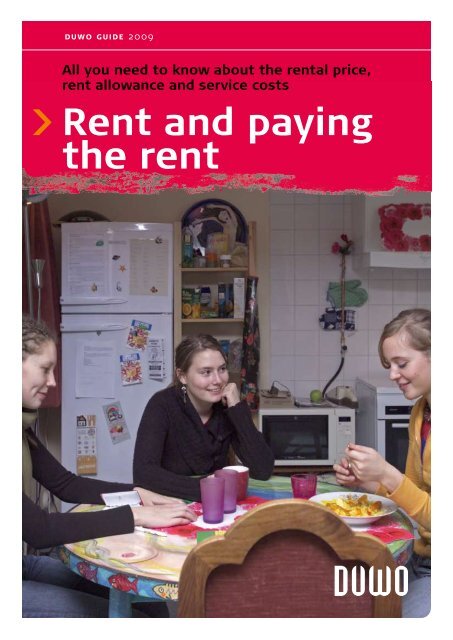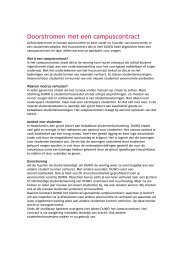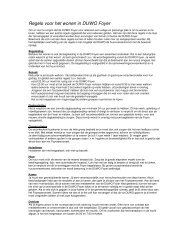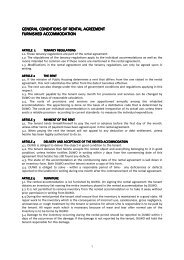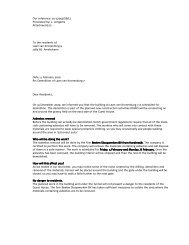Rent and paying the rent - Duwo
Rent and paying the rent - Duwo
Rent and paying the rent - Duwo
Create successful ePaper yourself
Turn your PDF publications into a flip-book with our unique Google optimized e-Paper software.
duwo guide 2009<br />
All you need to know about <strong>the</strong> <strong>rent</strong>al price,<br />
<strong>rent</strong> allowance <strong>and</strong> service costs<br />
> <strong>Rent</strong> <strong>and</strong> <strong>paying</strong><br />
<strong>the</strong> <strong>rent</strong>
Contents<br />
<strong>Rent</strong> <strong>and</strong> <strong>paying</strong> <strong>the</strong> <strong>rent</strong> 3<br />
<strong>Rent</strong>al price 3<br />
<strong>Rent</strong> allowance 5<br />
Service costs 6<br />
Types of service costs 8<br />
Paying <strong>the</strong> <strong>rent</strong> 11<br />
Adressess 12<br />
All brochures in <strong>the</strong> DUWO Guide can be downloaded at<br />
www.duwo.nl > Organisation > Folders<br />
July 2009
<strong>Rent</strong> & <strong>paying</strong> <strong>the</strong> <strong>rent</strong><br />
<strong>Rent</strong>al price<br />
The amount that you pay for your residence each month consists of various elements.<br />
In addition to <strong>the</strong> <strong>rent</strong>al price, <strong>the</strong> so-called basic <strong>rent</strong>, a payment for service costs is<br />
included.<br />
This brochure contains information regarding <strong>the</strong> composition of <strong>the</strong> <strong>rent</strong> alongside an<br />
explanation of <strong>the</strong> service costs <strong>and</strong> how <strong>the</strong>y are calculated. Some tenants are<br />
eligible for <strong>rent</strong> allowance. This brochure explains exactly what <strong>rent</strong> allowance is, <strong>and</strong><br />
<strong>the</strong> conditions that you have to meet in order to be eligible for <strong>rent</strong> allowance. Finally,<br />
<strong>the</strong> brochure also provides an explanation of <strong>the</strong> methods in which you can pay <strong>the</strong><br />
<strong>rent</strong> <strong>and</strong> <strong>the</strong> action DUWO will take if you have outst<strong>and</strong>ing <strong>rent</strong> to pay.<br />
The amount of <strong>rent</strong> that may be charged for accommodation must be linked to <strong>the</strong><br />
quality of <strong>the</strong> residence. The Ministry of Housing, Spatial Planning <strong>and</strong> <strong>the</strong><br />
Environment (VROM) has developed a system for rating <strong>the</strong> quality of residences<br />
based on certain factors (see also http://www.vrom.nl/woningwaarderingsstelsel).<br />
The maximum amount of <strong>rent</strong> that can be reasonably charged for a residence is<br />
dependent on how many points <strong>the</strong> residence is awarded. Factors that are taken into<br />
consideration include <strong>the</strong> type <strong>and</strong> size of <strong>the</strong> residence <strong>and</strong> <strong>the</strong> facilities that are<br />
available.<br />
The amount of <strong>rent</strong> that DUWO charges for a residence is known as <strong>the</strong> target <strong>rent</strong><br />
<strong>and</strong> is determined based on <strong>the</strong> market position of <strong>the</strong> residence. Hence <strong>the</strong> <strong>rent</strong> will<br />
be higher for a residence situated in a popular location in <strong>the</strong> town centre than for a<br />
residence outside of <strong>the</strong> town centre where housing is less popular.<br />
3
4<br />
The <strong>rent</strong> amounts set by DUWO for accommodation under its management are never<br />
higher than <strong>the</strong> maximum reasonable amount.<br />
For most tenants, <strong>the</strong> monthly <strong>rent</strong> will consist of:<br />
• <strong>the</strong> basic <strong>rent</strong>al price: payment for <strong>the</strong> use of <strong>the</strong> accommodation <strong>and</strong>, where<br />
applicable, gardens <strong>and</strong> communal areas.<br />
• <strong>the</strong> service costs: payment for <strong>the</strong> provision of certain goods <strong>and</strong> services. Your <strong>rent</strong>al<br />
agreement will state which goods <strong>and</strong> services are covered by <strong>the</strong> service costs. Gas,<br />
water, electricity <strong>and</strong> cleaning costs are likely to be included.<br />
> <strong>Rent</strong> increase<br />
The <strong>rent</strong> is subject to increase each year. At DUWO, <strong>the</strong> increased basic <strong>rent</strong> amount<br />
becomes effective on 1 July. The Ministry of Housing, Spatial Planning <strong>and</strong> <strong>the</strong><br />
Environment (VROM) determines <strong>the</strong> maximum percentage increase. The actual<br />
percentage increase can vary between diffe<strong>rent</strong> complexes or residences with <strong>the</strong><br />
price-quality ratio of a residence being <strong>the</strong> deciding factor. The <strong>rent</strong> increase will of<br />
course never exceed <strong>the</strong> limit determined by <strong>the</strong> Minister of Housing, Spatial Planning<br />
<strong>and</strong> <strong>the</strong> Environment. DUWO consults <strong>the</strong> body of tenants’ organisations regarding<br />
<strong>the</strong> average <strong>rent</strong> increase prior to taking action. You will receive written notice of <strong>the</strong><br />
<strong>rent</strong> increase percentage that will apply to your residence at least two months before<br />
<strong>the</strong> <strong>rent</strong> increase takes effect.<br />
> Problems with <strong>the</strong> amount of <strong>the</strong> <strong>rent</strong> increase?<br />
If you have an objection to <strong>the</strong> <strong>rent</strong> increase proposed by DUWO, you should inform<br />
DUWO in writing before <strong>the</strong> increase becomes effective. Making a complaint is only<br />
purposeful if <strong>the</strong> proposed <strong>rent</strong> amount is higher than <strong>the</strong> maximum reasonable<br />
amount, as defined in <strong>the</strong> applicable regulations. If DUWO disagrees with your<br />
complaint, you can request <strong>the</strong> <strong>Rent</strong> Committee to a make a judgement. Maintenance<br />
shortcomings do not constitute sufficient grounds for a written objection. However, in<br />
<strong>the</strong> case of severe maintenance shortcomings that have not been dealt with despite<br />
DUWO being previously notified, you have <strong>the</strong> right to submit a <strong>rent</strong> reduction<br />
proposal to DUWO. Should DUWO reject this proposal, you also have <strong>the</strong> right to<br />
request a judgement from <strong>the</strong> <strong>Rent</strong> Committee.<br />
The <strong>Rent</strong> Committee’s postal address is:<br />
De Huurcommissie, Postbus 16495, 2500 BL Den Haag<br />
http://www.huurcommissie.nl<br />
> Legal fees<br />
Legal fees will have to be paid for <strong>the</strong> majority of <strong>the</strong> cases addressed by <strong>the</strong> <strong>Rent</strong><br />
Committee. Legal fees amount to € 11.00 (2007 price level) <strong>and</strong> have to be paid in<br />
advance. After <strong>the</strong> application for a <strong>Rent</strong> Committee judgement has been received,<br />
<strong>the</strong> party who submitted <strong>the</strong> application will be sent a giro collection form. The legal<br />
fees need to be settled within four weeks after <strong>the</strong> giro collection form was sent. If<br />
<strong>the</strong> party submitting <strong>the</strong> application fails to pay on time, <strong>the</strong> case will not be<br />
processed. Hence, it is important to pay <strong>the</strong> legal fees on time. Once <strong>the</strong> <strong>Rent</strong><br />
Committee’s judgement has been announced, <strong>the</strong> victorious party will have <strong>the</strong> legal<br />
fees refunded. The exact prices can be found on www.huurcommissie.nl.<br />
> What is <strong>the</strong> procedure?<br />
After <strong>the</strong> legal fees have been received, relevant information is collected concerning<br />
<strong>the</strong> case <strong>and</strong> an investigation may be conducted in <strong>the</strong> residence. The letter is invited<br />
to be present at <strong>the</strong> investigation, during which <strong>the</strong> size of <strong>the</strong> residence <strong>and</strong> <strong>the</strong><br />
available facilities will be examined. If a <strong>rent</strong> reduction proposal by <strong>the</strong> tenant is<br />
involved, any maintenance shortcomings will also be examined. The letter <strong>and</strong> <strong>the</strong><br />
tenant both receive a copy of <strong>the</strong> investigation report as well as an invitation to<br />
attend a public hearing at <strong>the</strong> <strong>Rent</strong> Committee.
<strong>Rent</strong> allowance<br />
The public hearing provides both parties with <strong>the</strong> opportunity to respond to <strong>the</strong><br />
findings of <strong>the</strong> report, but attendance at <strong>the</strong> hearing is not obligatory.<br />
If you would like additional information regarding submitting an application for a <strong>Rent</strong><br />
Committee judgement, <strong>paying</strong> legal fees <strong>and</strong>/or <strong>the</strong> procedure, go to http://www.<br />
huurcommissie.nl<br />
> Cancelling your tenancy<br />
You can cancel your <strong>rent</strong>al agreement whenever you like, but do remember that you<br />
need to take a period of one month’s notice into account. Hence, if you would like<br />
your <strong>rent</strong>al agreement to end as of 18 August, you need to inform DUWO of your<br />
intentions on 18 July at <strong>the</strong> latest. Of course, it is also possible to cancel your tenancy<br />
longer than a month in advance of your departure. Please inform us that you would<br />
like to cancel your tenancy by sending us a letter or an e-mail. You can also download<br />
a tenancy cancellation form from our website. For more information, see <strong>the</strong> Moving<br />
House brochure.<br />
<strong>Rent</strong> allowance is a subsidy to assist with living expenses. If you pay too much <strong>rent</strong><br />
relative to your income, you may be eligible for a subsidy from <strong>the</strong> Dutch Tax Office:<br />
<strong>rent</strong> allowance. You can complete a test calculation on <strong>the</strong> website www.toeslagen.nl<br />
to determine whe<strong>the</strong>r you have <strong>the</strong> right to <strong>rent</strong> allowance. The website also contains<br />
additional general information about <strong>rent</strong> allowance. Naturally, you are also welcome<br />
to ask Stichting DUWO for more information. We are one of numerous Help <strong>and</strong><br />
Information Points (HIP), where everyone is welcome to ask questions about <strong>rent</strong><br />
allowance.<br />
> First application<br />
When you sign a <strong>rent</strong>al agreement with DUWO, all important information relevant to<br />
<strong>the</strong> <strong>rent</strong>al agreement is discussed. Naturally, <strong>rent</strong> allowance is not a subject that we<br />
overlook. Whe<strong>the</strong>r you are eligible for <strong>rent</strong> allowance depends on a number of<br />
factors, including <strong>the</strong> <strong>rent</strong>al price, your cur<strong>rent</strong> taxable income, your household<br />
composition <strong>and</strong> if applicable, your capital. One condition is that you are registered at<br />
<strong>the</strong> Gemeentelijke Basis Administratie (GBA) [Municipal Personal Records Database] at<br />
<strong>the</strong> address for which you are applying for <strong>rent</strong> allowance.<br />
Tenants living in shared accommodation will not usually be eligible for <strong>rent</strong> allowance.<br />
You can apply for <strong>rent</strong> allowance at DUWO. Before you do this, you will need to obtain<br />
your DigID (your personal log-in code for all matters involving government<br />
departments). If you do not already have your DigID, you can apply for it directly at<br />
www.digid.nl. You may also request an application form directly from <strong>the</strong> Dutch Tax<br />
Office by calling 0800-0543.<br />
When you apply for <strong>rent</strong> allowance, you will be required to indicate how much <strong>rent</strong><br />
you are <strong>paying</strong>. If you are unsure of <strong>the</strong> amount you should fill in, get in touch with<br />
DUWO <strong>and</strong> we will let you know <strong>the</strong> amount. Consulting DUWO helps to avoid that<br />
you will have to pay back money to <strong>the</strong> Dutch Tax Office if you have received too<br />
much <strong>rent</strong> allowance.<br />
> Changes<br />
If your living situation changes, you are required to contact <strong>the</strong> Dutch Tax Office as<br />
soon as possible. You should also consider <strong>the</strong> following changes: amendments to<br />
your household composition or income <strong>and</strong> change of address.<br />
5
Service costs<br />
6<br />
> When does <strong>the</strong> <strong>rent</strong> allowance become effective?<br />
The allowance year runs from 1 January to 1 January <strong>and</strong> it is possible to apply for <strong>the</strong><br />
subsidy at any time of <strong>the</strong> year. It is even possible to apply for backdated <strong>rent</strong><br />
allowance up until March of <strong>the</strong> new year. Should you begin <strong>rent</strong>ing a residence during<br />
<strong>the</strong> year <strong>and</strong> become eligible for <strong>rent</strong> allowance, <strong>the</strong> <strong>rent</strong> allowance will become<br />
effective on <strong>the</strong> first day of <strong>the</strong> following month. For example, if <strong>the</strong> <strong>rent</strong>al agreement<br />
becomes effective on 17 March, <strong>the</strong> <strong>rent</strong> allowance will start in April.<br />
> Subletting<br />
Subletting your room can have consequences for <strong>rent</strong> allowance. If <strong>the</strong> main tenant<br />
sublets a section of <strong>the</strong> residence, <strong>the</strong> amount of <strong>rent</strong> used by <strong>the</strong> Dutch Tax Office to<br />
calculate <strong>rent</strong> allowance will be reduced by 25%. This means that less <strong>rent</strong> allowance<br />
will be awarded, or that it will be cancelled altoge<strong>the</strong>r. You are personally responsible<br />
for informing <strong>the</strong> Dutch Tax Office of any applicable changes to your living situation. A<br />
condition of subletting is that a written subletting contract needs to have been<br />
drafted. It is not permitted for <strong>the</strong> sublettee to be a spouse, registered partner or<br />
immediate family of <strong>the</strong> main tenant, as <strong>the</strong>se people are always considered to be cooccupants.<br />
> House sitting<br />
House sitting (i.e. when <strong>the</strong> main tenant sublets <strong>the</strong> entire residence to ano<strong>the</strong>r<br />
resident <strong>and</strong> temporarily lives elsewhere) can also have consequences for <strong>the</strong> <strong>rent</strong><br />
allowance. The individual temporarily subletting <strong>the</strong> residence is viewed by <strong>the</strong> Dutch<br />
Tax Office as a co-occupant. Therefore, you need to inform <strong>the</strong> Dutch Tax Office of <strong>the</strong><br />
change to your living situation. The same applies when <strong>the</strong> house-sitting period is<br />
over, when you will need to inform <strong>the</strong> Dutch Tax Office that your living situation has<br />
once again changed. Of course, <strong>the</strong> temporary resident will need to fulfil <strong>the</strong> relevant<br />
conditions to be eligible for <strong>rent</strong> allowance. Should a temporary resident fail to satisfy<br />
<strong>the</strong> relevant conditions, <strong>the</strong> amount of (<strong>and</strong> eligibility for) <strong>rent</strong> allowance can be<br />
affected. Please contact DUWO for more information regarding <strong>the</strong> conditions.<br />
> <strong>Rent</strong> moderation<br />
Should you be eligible for a certain amount of <strong>rent</strong> allowance, you can receive it in<br />
two ways: paid directly to your bank or giro account, or as <strong>rent</strong> moderation (clustered<br />
payment) via DUWO. The majority of tenants in DUWO accommodation select <strong>rent</strong><br />
moderation, which means that <strong>the</strong>y pay a lower <strong>rent</strong>al price. If you select this option,<br />
you will need to state that <strong>the</strong> <strong>rent</strong> allowance should be paid directly to <strong>the</strong> letter<br />
when you fill out <strong>the</strong> application form. You will also need to enter DUWO’s bank<br />
account number <strong>and</strong> Chamber of Commerce number (27220173).<br />
In addition to <strong>rent</strong>ing you a residence, DUWO also provides goods <strong>and</strong> services for an<br />
agreed fee: <strong>the</strong> ‘service costs’. The majority of tenants pay for <strong>the</strong>ir gas, water <strong>and</strong><br />
electricity via DUWO. In addition to this, such services as cleaning communal areas<br />
<strong>and</strong> garden maintenance are also paid for via <strong>the</strong> service costs.<br />
It is also possible to supplement <strong>the</strong> service costs with a service contract <strong>and</strong> a<br />
contribution to one of <strong>the</strong> tenants’ organisations. By entering into a service contract,<br />
DUWO will take responsibility for any ‘tenants’ maintenance’ required in your<br />
residence.<br />
Your <strong>rent</strong>al agreement states exactly which items are covered by <strong>the</strong> service contract.<br />
Nearly all new DUWO tenants sign <strong>the</strong> service contract.
The amount paid for <strong>the</strong> service costs varies from complex to complex <strong>and</strong> even<br />
between individual residences. Service costs are adjusted at <strong>the</strong> same time as <strong>the</strong><br />
<strong>rent</strong>, which means that you will pay a diffe<strong>rent</strong> amount for <strong>the</strong> service costs as of 1<br />
July. You will receive a settlement for <strong>the</strong> previous calendar year at <strong>the</strong> end of June at<br />
<strong>the</strong> latest, at which time <strong>the</strong> new service costs will also be announced. The monthly<br />
payment is an advance payment based upon an estimate. At <strong>the</strong> end of June, <strong>the</strong><br />
amounts paid are balanced with <strong>the</strong> actual costs. It will <strong>the</strong>n become clear whe<strong>the</strong>r<br />
you have paid too much or too little in <strong>the</strong> previous calendar year, <strong>and</strong> DUWO will<br />
ei<strong>the</strong>r give you a refund or ask for an additional payment accordingly.<br />
> Shared accommodation<br />
If you <strong>rent</strong> shared accommodation, <strong>the</strong> service costs may also include payment for <strong>the</strong><br />
cable TV service <strong>and</strong> a contribution to small maintenance in <strong>the</strong> communal areas. In<br />
addition, you will sometimes have to pay for sewerage rights, <strong>the</strong> waste materials levy<br />
<strong>and</strong> any o<strong>the</strong>r local authority taxes.<br />
> Independent accommodation<br />
If you live in independent accommodation without communal facilities, you will<br />
normally pay local authority taxes such as <strong>the</strong> waste materials levy, sewerage rights<br />
<strong>and</strong> <strong>the</strong> anti-pollution levy directly to <strong>the</strong> local authority. The local authority will send<br />
you an invoice for any taxes you are required to pay.<br />
> Settlement<br />
Tenants that are entitled to a refund will receive <strong>the</strong>ir money back as soon as<br />
possible. If you are required to pay additional costs, DUWO will send you a separate<br />
invoice. The amounts for <strong>the</strong> glass insurance, <strong>the</strong> service contract <strong>and</strong> <strong>the</strong> contents<br />
insurance are fixed <strong>and</strong> are not settled.<br />
> Passing on charges<br />
Service costs are based on <strong>the</strong> tenant’s expected usage. But if you receive a<br />
considerable sum of money back for <strong>the</strong> previous year, for example due to a mild<br />
winter, it doesn’t automatically mean that your service costs will be lowered.<br />
If <strong>the</strong> following winter is extremely cold, <strong>the</strong> next settlement would come as a nasty<br />
surprise. DUWO takes this into consideration when determining <strong>the</strong> amounts to be<br />
paid in advance. After all, it’s always nicer to receive some money back than to have<br />
to pay more.<br />
> Division system for shared accommodation<br />
In several DUWO complexes, <strong>the</strong> service costs are shared amongst <strong>the</strong> number of<br />
residents. This concerns complexes in which not every residence is fitted with its own<br />
meter. The total energy costs in <strong>the</strong>se complexes are divided using a division system.<br />
This division system ascribes a number of service cost units to a residence. You can<br />
read more about <strong>the</strong> specific division of <strong>the</strong> costs in <strong>the</strong> ‘<strong>Rent</strong> conditions’ brochure. At<br />
a few complexes, diffe<strong>rent</strong> agreements have been made concerning <strong>the</strong> division<br />
system.<br />
7
Types of service costs<br />
8<br />
> Supplementing <strong>the</strong> service costs package<br />
Additions can be made to <strong>the</strong> service costs package following a proposal from your<br />
tenants’ organisation. For example, perhaps you would like more regular cleaning. The<br />
tenants’ organisation can <strong>the</strong>n discuss this with DUWO. If a significant majority of<br />
residents (70% or more) agree to <strong>the</strong> addition, an item can be added to <strong>the</strong> service<br />
costs. DUWO can also make additions to <strong>the</strong> service cost package. If, following<br />
consultation with <strong>the</strong> residents’ committee, a majority of <strong>the</strong> residents agree to a<br />
proposed addition, DUWO is authorised to implement a change. For more detailed<br />
information about this, see <strong>the</strong> <strong>Rent</strong> conditions brochure.<br />
The most common service costs are listed below. Your <strong>rent</strong>al agreement contains an<br />
overview of <strong>the</strong> actual costs you pay.<br />
> Household waste <strong>and</strong> cleaning<br />
In most cases, this includes <strong>the</strong> collection of household waste <strong>and</strong> bulky household<br />
waste, replacing lamps in communal areas, cleaning windows <strong>and</strong> window/door<br />
frames, cleaning contracts <strong>and</strong> cleaning ventilation valves in communal areas.
Garden maintenance<br />
DUWO will pay for <strong>the</strong> initial design <strong>and</strong> construction of grounds when a complex is<br />
completed. The costs of any fur<strong>the</strong>r necessary maintenance <strong>and</strong> construction will be<br />
passed on to you as part of <strong>the</strong> service costs. If you <strong>rent</strong> accommodation in a complex<br />
with communal gardens or green areas linked to <strong>the</strong> complex, you will pay for<br />
maintenance via <strong>the</strong> service costs.<br />
> Internet<br />
In a number of complexes, tenants can receive internet for a fixed price.<br />
> Energy: electricity, gas <strong>and</strong> water<br />
Unless you pay <strong>the</strong> energy company directly, you will pay for your electricity, gas <strong>and</strong><br />
water via <strong>the</strong> service costs. This is especially applicable to tenants living in shared<br />
accommodation.<br />
> CAI/CAS/Signal supply<br />
If DUWO supplies <strong>the</strong> tenant with a TV <strong>and</strong> radio signal using a communal antenna or<br />
CAI operated by DUWO, <strong>the</strong>y will invoice <strong>the</strong> tenant for <strong>the</strong> costs of operation. DUWO<br />
will also pass on <strong>the</strong> charges to <strong>the</strong> tenant if a TV <strong>and</strong> radio signal is supplied that<br />
have been purchased from a cable television provider.<br />
9
10<br />
> Contribution to tenants’ organisations<br />
You pay a contribution towards covering <strong>the</strong> costs of <strong>the</strong> activities carried out by <strong>the</strong><br />
tenants’ organisations, such as organising meetings, hiring experts <strong>and</strong> <strong>the</strong> necessary<br />
administration <strong>and</strong> correspondence. The contribution you pay via <strong>the</strong> service costs<br />
does not include <strong>the</strong> cost of organising events.<br />
> Contents insurance<br />
Residents of shared accommodation (rooms) in one or two room residences have <strong>the</strong><br />
option of taking out contents insurance via DUWO in order to benefit from favourable<br />
conditions <strong>and</strong> great prices.<br />
> Service contract<br />
As tenant, you are responsible for carrying out various small-scale maintenance<br />
activities in your residence. By signing a service contract, you h<strong>and</strong> over <strong>the</strong>se<br />
responsibilities to DUWO. More information is available in <strong>the</strong> Alterations <strong>and</strong><br />
Maintenance brochure.<br />
> Levies/Taxes<br />
This covers a number of municipal taxes, including: sewerage rights, <strong>the</strong> waste<br />
materials levy <strong>and</strong> water taxes.<br />
> Floor covering in communal areas<br />
All costs incurred by DUWO for movable property used by tenants will be passed onto<br />
tenants via <strong>the</strong> service costs. In <strong>the</strong> case of unfurnished rooms, <strong>the</strong> primary concern is<br />
wear <strong>and</strong> tear to floor covering. If <strong>the</strong> floor covering is damaged through improper<br />
use, <strong>the</strong> tenant will be invoiced for <strong>the</strong> costs of repairing <strong>the</strong> damage. However, if <strong>the</strong><br />
damage is simply due to wear <strong>and</strong> tear over time, <strong>the</strong> floor covering can be replaced<br />
<strong>and</strong> <strong>the</strong> costs will be included in <strong>the</strong> service costs.<br />
> Glass insurance<br />
DUWO has taken out insurance for all interior <strong>and</strong> exterior glasswork. The costs of<br />
this insurance are passed on to <strong>the</strong> tenant based on <strong>the</strong> average premium.<br />
In addition, tenants also pay:<br />
> Administrative costs<br />
In order to cover <strong>the</strong> administration costs linked to <strong>the</strong> service costs, DUWO invoices<br />
<strong>the</strong> permitted additional 2% on <strong>the</strong> energy costs <strong>and</strong> 5% on <strong>the</strong> o<strong>the</strong>r elements<br />
included in <strong>the</strong> service costs.<br />
> Loss of <strong>rent</strong><br />
By law, DUWO has <strong>the</strong> right to invoice <strong>the</strong> tenant for up to 2% of <strong>the</strong> total service<br />
costs to cover vacant property loss. This covers <strong>the</strong> risk of diminished receipt of<br />
service cost payments resulting from a residence being temporarily vacant.
Paying <strong>the</strong> <strong>rent</strong><br />
<strong>Rent</strong> needs to be paid in advance of <strong>the</strong> month in question, which means that DUWO<br />
should receive <strong>the</strong> <strong>rent</strong> on or before <strong>the</strong> first day of each month. <strong>Rent</strong> can be paid in a<br />
variety of ways. You can pay by direct debit or by giro collection, in which case we will<br />
send you a giro collection form every month. If you are unable to pay using ei<strong>the</strong>r of<br />
<strong>the</strong>se methods, you can also pay <strong>the</strong> <strong>rent</strong> in person at <strong>the</strong> DUWO offices, preferably<br />
using a debit card.<br />
> Outst<strong>and</strong>ing <strong>rent</strong><br />
DUWO will send you a reminder if you do not pay <strong>the</strong> <strong>rent</strong>. Should you ignore this<br />
reminder, you will receive a final warning. If you persist to ignore <strong>the</strong> reminders, you<br />
can expect to receive a notice from <strong>the</strong> bailiff. Costs are always linked to <strong>the</strong> final<br />
warning <strong>and</strong> bailiff’s notice, <strong>and</strong> you will be responsible for <strong>the</strong>se so-called<br />
extrajudicial costs incurred by DUWO in collecting <strong>the</strong> outst<strong>and</strong>ing <strong>rent</strong>.<br />
It is clearly advisable not to let things get this serious. If you know that you will not<br />
be able to pay <strong>the</strong> <strong>rent</strong> on <strong>the</strong> first day of <strong>the</strong> month, contact DUWO as soon as<br />
possible. DUWO will arrange a repayment schedule for you free of charge. The<br />
conditions attached to a repayment schedule are dependent on your personal<br />
situation <strong>and</strong> we would be pleased to discuss this with you at <strong>the</strong> DUWO offices.<br />
In addition, we can provide you with information regarding debt repayment agencies<br />
with whom we work. During this process, your privacy remains of <strong>the</strong> utmost priority.<br />
Of course, we hope that it won’t come to this. Payment by direct debit dramatically<br />
reduces <strong>the</strong> chance of you being in <strong>the</strong> position of owing outst<strong>and</strong>ing <strong>rent</strong>.<br />
> Direct debit<br />
The easiest way to pay <strong>the</strong> <strong>rent</strong> is by direct debit. This means you can never forget to<br />
pay <strong>and</strong> it also helps you avoid owing outst<strong>and</strong>ing <strong>rent</strong>. By completing a st<strong>and</strong>ing<br />
order, you can authorise DUWO to collect <strong>the</strong> amount you owe from your account<br />
every month. If you wish, you can decide to cancel <strong>the</strong> st<strong>and</strong>ing order at a later date.<br />
In addition, you have <strong>the</strong> security of knowing that you can reverse <strong>the</strong> st<strong>and</strong>ing order<br />
transaction up to a month after it was carried out, should you not agree with <strong>the</strong><br />
amount collected from your account.<br />
If you complete <strong>the</strong> st<strong>and</strong>ing order, DUWO will collect <strong>the</strong> required amount from your<br />
account on <strong>the</strong> first workday of <strong>the</strong> month. Naturally, you need to have sufficient<br />
funds available in your account. It is also possible to authorise your bank to transfer<br />
<strong>the</strong> required amount to DUWO every month, although this does have <strong>the</strong><br />
disadvantage that you will have to give <strong>the</strong> bank new instructions if <strong>the</strong> <strong>rent</strong> changes.<br />
If you authorise DUWO to collect <strong>the</strong> <strong>rent</strong>, this is not necessary. Nor is it necessary to<br />
send a new authorisation form (st<strong>and</strong>ing order) if you move to ano<strong>the</strong>r DUWO<br />
residence. However, you may receive a one-off giro collection to cover <strong>the</strong> transfer<br />
period.<br />
If you wish, it is possible for someone o<strong>the</strong>r than <strong>the</strong> individual named on <strong>the</strong> <strong>rent</strong>al<br />
agreement to pay <strong>the</strong> <strong>rent</strong>. It is important that you inform us if you plan to make such<br />
an arrangement.<br />
11
Addresses<br />
12<br />
Delft branch<br />
Kanaalweg 4<br />
2628 EB Delft<br />
T 015 - 219 22 00<br />
F 015 - 215 80 15<br />
E info@duwo.nl<br />
DUWO-TU Delft Accommodation Shop<br />
Kanaalweg 4<br />
2628 EB Delft<br />
T 015 - 219 22 22<br />
F 015 - 215 80 15<br />
E info@duwo.nl<br />
The Hague/Leiden branch<br />
Stamkartplein 98<br />
2521 ER Den Haag<br />
T 070 - 305 14 00<br />
F 070 - 305 14 04<br />
E denhaag@duwo.nl<br />
Amsterdam branches<br />
Uilenstede 108<br />
1183 AM Amstelveen<br />
T 020 - 543 11 00<br />
F 020 - 543 11 01<br />
E uilenstede@duwo.nl<br />
Spinozastraat 51-53<br />
1018 HJ Amsterdam<br />
T 020 - 344 95 44<br />
F 020 - 625 73 54<br />
E amsterdam@duwo.nl<br />
Postal address for all locations:<br />
Postbus 54<br />
2600 AB Delft<br />
I www.duwo.nl


